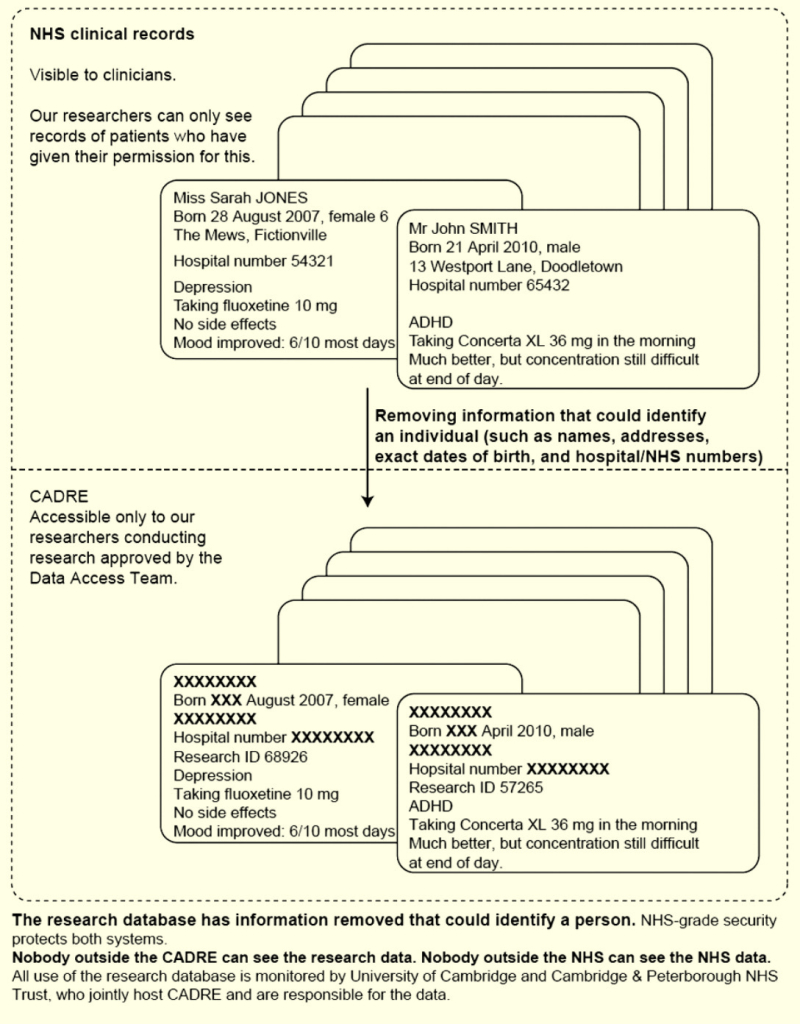About us
Routinely collected data from healthcare services, social services and education will help us build the bigger picture.
Jump to —
Jump to —
CADRE is a network of local databases that are linked together. It has been designed purely for children’s health research, innovation and service improvement.
We know many things can affect a young person’s mental and physical health. Genetics, the environment they’re brought up in, and early experiences play a part, as do factors like their immune system, gut health, and levels of inflammation. CADRE will provide a wide-ranging de-identified data set to get a complete picture of how all these distinct factors work together.
The first CADRE is currently in development in Cambridge. We have partnered with NIHR Mental Health Translational Research Collaboration Mental Health Mission (NIHR MH-TRC MHM) to bring CADREs to other parts of the UK and help researchers understand and support the mental health needs of children and young people.

What problem is CADRE trying to solve?
Local NHS services, social services, and schools routinely collect valuable information about children and young people. Researchers and professionals with the right credentials already have legal permission to apply to use health, education, and social care data to improve healthcare services. The problem is that when they need to work with a large amount of data, perhaps to measure the levels of child mental health in different organisations within a region, or to understand the impact of a new service that is introduced, it can be difficult to pull it all together because the data they need is scattered across so many diverse sources.
CADRE (Children and Adolescents Data Resource) has been developed to try to solve this problem.

How will it help young people?
CADRE will allow researchers to understand healthcare needs better, by building a bigger picture around the problems children and young people face, how they are getting on at school and any social problems that might be affecting their area. This will help us come up with better solutions and understand which types of treatments and support are most effective. It should also help local service providers allocate their funding where it’s needed most, and to the right people.
For example, in one project, Timely researchers plan to use data to help them design a suite of AI and digital tools to help professionals such as GPs, social workers or hospital staff to identify young people who might be struggling with mental health but aren’t getting the help that they need.

How will the database work?
1. Local services agree to share their data about children and young people with CADRE
2. Information that can identify a person (such as names, addresses, NHS numbers) is removed from clinical data while it is still in local services.
3. Once the de-identification has been checked, the de-identified datasets are securely fed into the CADRE database.
4. The data is linked together and securely stored.
5. Within CADRE, data is converted into a common format and organised so researchers can use it more easily.
6. Separately, the identifiers – which will be needed to re-identify a person in specific circumstances – are also securely fed into the CADRE database and stored in a distinct environment which will never be accessible to researchers.
7. A researcher sends a request to use relevant data for a project, based on a specific research question.
8. Access to the de-identified database will be granted to researchers under very specific circumstances through a screening process.
9. If the project is approved, the researcher is given limited access those areas of the de-identified database they need for their project and given training on how to use it properly.
10. Approved researchers, to further their understanding, will search the database for de-identified records meeting their inclusion criteria to request re-identification. The consent of the child or their parent/guardian will be sought before the researcher can view the child’s clinical records and contact the family.
The diagram below illustrates the difference between clinical records and the research data in CADRE

How will you keep the data safe?
We use the Five Safes framework, which is a set of principles that allows data services to provide safe research access to data. The framework is considered best practice in data protection and is used by a range of other similar databases across the UK including Health Data Research-UK (HDR-UK) and the National Institute for Health Research Design Service (NIHR). Find out more about the Five Safes framework. The principles are described below.
The Five Safes
- Safe data: data is de-identified to protect patient confidentiality.
- Safe projects: research projects are approved by the data access committee for the public good.
- Safe people: researchers are trained and authorised to use data safely.
- Safe settings: a SecureLab environment prevents unauthorised access or use.
- Safe outputs: screened and approved outputs that do not disclose personal data.
There’s more information on the Understanding Patient Data website.

Who is involved in the project?
The University of Cambridge and Cambridgeshire NHS Foundation Trust (CPFT) are responsible for CADRE. They provide oversight for the data security and how the data is used.
The project is led by Dr Anna Moore, the Principal Investigator. Dr Moore is a consultant child psychiatrist at CPFT and works in paediatric psychological medicine services at Cambridge University Hospitals. She is also assistant professor of child psychiatry at the University of Cambridge, Department of Psychiatry.
She is also the Primary Investigator for THRIVE, which is exploring how best to deliver whole system, integrated mental health care for children and young people, and the clinical lead for D-CYPHR, an initiative for better genomic research in children’s health. Anna is the Programme Lead for both CADRE and TIMELY, under a broader research initiative to transform the way young people can access timely and appropriate support for their mental health.
The development of CADRE has been supported by funding from:
We work with many partners, all of whom are critical to helping us build and run CADRE
Our Partners
Anna Freud
Read
is a world-leading mental health charity for children and families. It supports our Patient and Public Involvement activities via CA:RING (Children and Adolescents: Research Involvement for the Next Generation).
Visit website
Bitfount
Read
is a federated AI and data science platform which enables federated analyses across the CADRE network. The platform provides privacy checks in the release controls, requiring any data leaving CADRE to have differential privacy at an approved level.
Cambridge University Hospitals
Read
is a family of NHS hospitals, delivering expert patient-led care.
CRATE
Read
is an open-source software developed at the University of Cambridge. It provides de-identification tools which enable data to be pseudonymised at the source before it enters CADRE, but gives us the functionality to accurately link data across different sources (healthcare, education and social care).
DATAMIND
Read
DATAMIND is the Hub for Mental Health Informatics Research Development, transforming mental health research across the UK. Co-directed by Professor Ann John (Swansea University) and Professor Rob Stewart (King’s College London), it is funded by the Medical Research Council (MRC) and runs to 2029.
DATAMIND ensures the findability, accessibility, interoperability, and reusability (FAIR) of data, making anonymised data from diverse sources easy to access for better research outcomes. Through collaboration with researchers, policymakers, charities, industry, and more, it drives meaningful change. Above all, it prioritises involving patients and the public to shape research that improves lives.
InterMine
Read
is an open-source software which provides an easy-to-use interface for standardising data from different sources into a compatible format. It additionally defines “Data Extraction Contracts” which restricts researchers to using only specific sub-sets of data relevant to their project.
Information Governance Services
Read
are subject matter experts in all things data protection and information governance. They are helping us develop the data federation framework across the CADRE network to ensure that it is compliant with data protection legislation.
NIHR Mental Health Translational Research Collaboration Mental Health Mission (NIHR MH-TRC MHM)
Read
This research was funded by the Office for Life Sciences and the National Institute for Health and Care Research (NIHR) Mental Health Translational Research Collaboration, hosted by the NIHR Oxford Health Biomedical Research Centre.
The NIHR MH-TRC MHM is one of the healthcare research priorities announced by the UK government as part of its ‘Life Sciences Vision’ (.PDF). The MHM aims to increase capacity in mental health research through providing relevant training and creating better systems to support industry and academic led research and investment across the UK. Specific focus is paid to addressing both areas of unmet need and high burden of mental illness.
Cambridge Team
CADRE is led by Dr Anna Moore. Anna is Assistant Professor in Child Psychiatry and Medical Informatics at the University of Cambridge and an Honorary Consultant in Paediatric Psychological Medicine at the Cambridgeshire and Peterborough NHS Foundation Trust.
ORCID
LinkedIn
Technical Team
Rudolf Cardinal
Professor of Psychiatry and Informatics,
University of Cambridge
ORCID
Jonathan Lewis
Database Manager, Cambridgeshire
and Peterborough NHS Foundation Trust
Rachel Sippy
Research Fellow,
University of Cambridge
ORCID
LinkedIn
Gos Micklem
Professor of Computational and Molecular Biology,
University of Cambridge
ORCID
LinkedIn
Governance Team
Taj Sallamuddin
Information Lawyer, Information Governance Services
LinkedIn
Sarah Tantin
Information Law Consultant, Information Governance Services
LinkedIn
Patient and Public Involvement Team
Jessica Young
Patient and Public Involvement and Engagement Lead
LinkedIn
NIHR Mental Health Translational Research Collaboration Mental Health Mission (NIHR MH-TRC MHM) Children and Young People’s Mental Health
Professor Rebecca Elliott at the University of Manchester and Professor Helen Minnis at the University of Glasgow are leading on the Children and Young People’s theme for the NIHR Mental Health Translational Research Collaboration Mental Health Mission.
The CADRE partnership will be supporting the delivery of the theme’s “System Development and Integration” work package. Professor Jonathan Green at the University of Manchester will support as a lead for this work package. You can read more here: https://oxfordhealthbrc.nihr.ac.uk/mhm/children-and-young-peoples-mental-health/
Other CADRE Teams
CADRE Greater Manchester is in the initial development phases.
Additionally, we are setting up CADRE sites in West Midlands and Merseyside.
More details to follow soon.